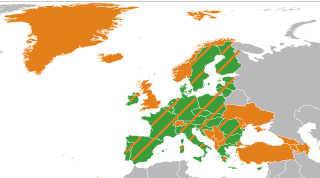
The European Convention on Human Rights is an international convention to protect human rights and political freedoms in Europe. Drafted in 1950 by the then newly formed Council of Europe, the convention entered into force on 3 September 1953. All Council of Europe member states are party to the convention and new members are expected to ratify the convention at the earliest opportunity.
International human rights instruments are the treaties and other international texts that serve as legal sources for international human rights law and the protection of human rights in general. There are many varying types, but most can be classified into two broad categories: declarations, adopted by bodies such as the United Nations General Assembly, which are by nature declaratory, so not legally-binding although they may be politically authoritative and very well-respected soft law;, and often express guiding principles; and conventions that are multi-party treaties that are designed to become legally binding, usually include prescriptive and very specific language, and usually are concluded by a long procedure that frequently requires ratification by each states' legislature. Lesser known are some "recommendations" which are similar to conventions in being multilaterally agreed, yet cannot be ratified, and serve to set common standards. There may also be administrative guidelines that are agreed multilaterally by states, as well as the statutes of tribunals or other institutions. A specific prescription or principle from any of these various international instruments can, over time, attain the status of customary international law whether it is specifically accepted by a state or not, just because it is well-recognized and followed over a sufficiently long time.

The European Court of Human Rights, also known as the Strasbourg Court, is an international court of the Council of Europe which interprets the European Convention on Human Rights. The court hears applications alleging that a contracting state has breached one or more of the human rights enumerated in the convention or its optional protocols to which a member state is a party. The European Convention on Human Rights is also referred to by the initials "ECHR". The court is based in Strasbourg, France.
Loizidou v. Turkey is a landmark legal case regarding the rights of refugees wishing to return to their former homes and properties. The European Court of Human Rights ruled that Titina Loizidou, and consequently all other refugees, have the right to return to their former properties. The ECHR ruled that Turkey had violated Loizidou's human rights under Article I of Protocol I of the European Convention on Human Rights, that she should be allowed to return to her home and that Turkey should pay damages to her. Turkey initially ignored this ruling.

Islam in Greece is represented by two distinct communities; Muslims that have lived in Greece since the times of the Ottoman Empire and Muslim immigrants that began arriving in the last quarter of the 20th century, mainly in Athens and Thessaloniki. Muslims in Greece are mainly immigrants from The Middle East, other Balkan regions & North Africa.
The 2006 deportation of Georgians from Russia refers to the deaths, unlawful arrests, expulsions and overall mistreatment of several thousand ethnic Georgians by the Russian government during the 2006 Georgian–Russian espionage controversy. The official Russian position was that Georgians in question violated the Russian immigration law and that their expulsion and treatment in custody was just standard law enforcement. The Georgian government countered that Russia's concerted actions against ethnic Georgians, including properly documented individuals, was an act of political retribution for the arrest of Russian spies and was tantamount to "mild form of ethnic cleansing". Georgian claims were supported by the Human Rights Watch, which documented "the Russian government's arbitrary and illegal detention and expulsion of Georgians, including many who legally lived and worked in Russia..." Georgia subsequently sued the Russian Government in the European Court of Human Rights (ECHR).
Human rights in Cyprus are protected by the constitution of the Republic of Cyprus.
The Church of Scientology Moscow v Russia [2007] ECHR 258 is a European Court of Human Rights case, concerning Article 11 of the convention. In the case the European Court of Human Rights in Strasbourg condemned Moscow City Government's refusal to consider the Church of Scientology of Moscow for registration as a religious organisation, and as a result found that Russia had violated the rights of the Church of Scientology under Articles 11 when "read in the light of Article 9". Specifically, the Court determined that, in denying consideration of registration to the Church of Scientology of Moscow, the Moscow authorities "did not act in good faith and neglected their duty of neutrality and impartiality vis-à-vis the applicant's religious community". The Court also awarded the Church €10,000 in respect of non-pecuniary damage and €15,000 for costs and expenses.

Capital punishment in Latvia was abolished for ordinary crimes in 1999 and for crimes committed during wartime in 2012. Latvia is party to several international instruments which ban the capital punishment.
Article 10 of the European Convention on Human Rights provides the right to Freedom of Expression and Information. A fundamental aspect of this right is the freedom to hold opinions and receive and impart information and ideas, even if the receiver of such information does not share the same opinions or views as the provider.
Article 8 of the European Convention on Human Rights provides a right to respect for one's "private and family life, his home and his correspondence", subject to certain restrictions that are "in accordance with law" and "necessary in a democratic society". The European Convention on Human Rights (ECHR) is an international treaty to protect human rights and fundamental freedoms in Europe.
Article 3 of the European Convention on Human Rights prohibits torture, and "inhuman or degrading treatment or punishment".
Article 3 – Prohibition of torture
No one shall be subjected to torture or to inhuman or degrading treatment or punishment.
The European Union's (EU) Treaty of Lisbon, in force since 1 December 2009, requires the EU to accede to the European Convention on Human Rights (ECHR). Article 6 of the consolidated Treaty on European Union states "The Union shall accede to the European Convention for the Protection of Human Rights and Fundamental Freedoms. Such accession shall not affect the Union's competences as defined in the Treaties." The EU would thus be subject to its human rights law and external monitoring as its member states currently are. It is further proposed that the EU join as a member of the Council of Europe now that it has attained a single legal personality in the Lisbon Treaty.
Article 18 of the European Convention on Human Rights (ECHR) states:
The restrictions permitted under this Convention to the said rights and freedoms shall not be applied for any purpose other than those for which they have been prescribed.
The Isle of Man is a Crown Dependency located in the Irish Sea between the islands of Great Britain and Ireland with a population in 2015 estimated to be approximately 88,000. It enjoys a high degree of domestic, legislative and political autonomy through its ancient Parliament Tynwald. By convention, the United Kingdom Government is responsible for the conduct of the international relations and defence of the island. The Isle of Man does not have a written constitution, or a Bill of Rights which sets out its Human Rights. These rights are addressed in the Human Rights Act 2001. The island has also ratified a number of international treaties.
The right to family life is the right of all individuals to have their established family life respected, and to have and maintain family relationships. This right is recognised in a variety of international human rights instruments, including Article 16 of the Universal Declaration of Human Rights, Article 23 of the International Covenant on Civil and Political Rights, and Article 8 of the European Convention on Human Rights.

Council of Europe–European Union relations are the bilateral relations between the Council of Europe and the European Union. The Council of Europe and the European Union have shared relations since 1992. Almost 180 programmes have been implemented between the two European organisations in areas such as human rights, culture, democracy, and the rule of law.
Human rights in the Kingdom of Denmark are protected by the state's Constitution of the Realm (Danmarks Riges Grundlov); applying equally in Denmark proper, Greenland and the Faroe Islands, and through the ratification of international human rights treaties. Denmark has held a significant role in the adoption of both the European Convention on Human Rights and in the establishment of the European Court of Human Rights (ECHR). In 1987, the Kingdom Parliament (Folketinget) established a national human rights institution, the Danish Centre of Human Rights, now the Danish Institute for Human Rights.
In September 1967, Denmark, Norway, Sweden and the Netherlands brought the Greek case to the European Commission of Human Rights, alleging violations of the European Convention of Human Rights (ECHR) by the Greek junta, which had taken power earlier that year. In 1969, the Commission found serious violations, including torture; the junta reacted by withdrawing from the Council of Europe. The case received significant press coverage and was "one of the most famous cases in the Convention's history", according to legal scholar Ed Bates.





